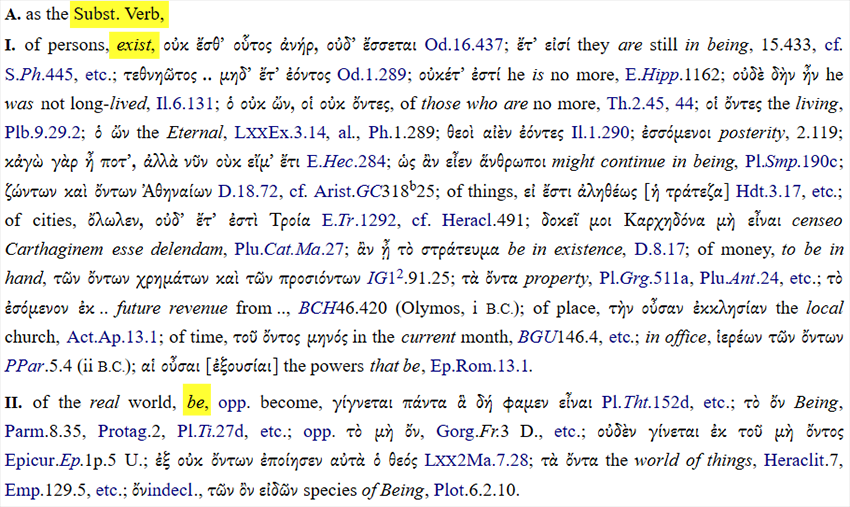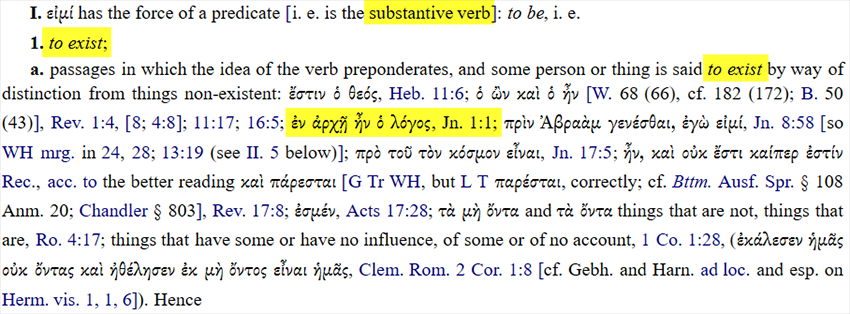This question is based on a comment on this post to this question. In the comment, it was denied that the verb ἦν in John 1:1a (viz., ἐν ἀρχῇ ἦν ὁ λόγος) is functioning as a substantive verb. It was affirmed, rather, that it was functioning as a stative verb and that “Ειμι is always stative.”
Now, if ἦν is always stative, then εἰμί is always stative, as ἦν is a conjugation of εἰμί. According to LSJ on εἰμί, the first entry (A.), it states that εἰμί can be used as a substantive verb with the meaning of “exist” and “be.”
We should not confuse the terms “substantive verb” and “substantive.” Here are some brief definitions of the term “substantive verb”:
Coghlan, p. 33:
Substantive Verb: one which simply expresses being. Hence the verb ‘to be’ is the only substantive verb in the language. It is therefore called the substantive verb; its characteristic function being to express the existence of a substance without the notion of action.
Earle, p. 289:
...the substantive verb to be ... The ‘substantive verb’ is so called, not from any connection with the part of speech called a substantive; but for a distinct reason. It is the verb which expresses least of all verbs; for it expresses nothing but existence. ... The verb substantive, then, is the verb which, unlike all other verbs, confines itself to the assertion of existence, which in all other verbs is contained by implication.
Not only LSJ, but also Thayer recognizes that εἰμί can function as a substantive verb, citing John 1:1a (ἐν ἀρχῇ ἦν ὁ λόγος) as one of the instances.
A stative verb, on the other hand, which εἰμί can certainly function as, just like the English verb “to be,” describes a static condition or state of being. For example, “I am sick.” “I am tired.” “I am happy.” But, not “I am,” and not “The Word was.” In the aforementioned examples, the verb is followed by a predicate adjective (“sick,” “tired,” “happy”). This is not the case with ἦν in John 1:1a. There is simply the subject ὁ λόγος, the verb ἦν, and the prepositional phrase ἐν ἀρχῇ modifying the verb ἦν. There is no predicate adjective.
Questions
(1) Is εἰμί (and ἦν) always stative (contra LSJ, Thayer)?
(2) Is ἦν functioning as a substantive verb with the meaning of “exist” in John 1:1a (the first independent clause in John 1:1)? Hence, “In the beginning, the Word was existing.”1
Footnotes
1 Blum, p. 393
References
Blum, Edwin A. The Bible Knowledge Commentary: Gospels. Ed. Walvoord, John F.; Zuck, Roy B. Colorado Springs: Cook, 2018.
Coghlan, John. Reformed English Grammar: A Critique & Textual Outline of English Grammar. Edinburgh: Nimmo, 1868.
Earle, John. The Philology of the English Tongue. 4th ed. Oxford: Clarendon Press, 1887.
Liddell, Henry George; Scott, Robert; et al. A Greek-English Lexicon. 9th ed. with revised supplement. Oxford: Clarendon, 1996.
Wilke, Christian Gottlob. A Greek-English Lexicon of the New Testament: Being Grimm Wilke’s Clavis Novi Testamenti. Trans. Thayer, Joseph Henry. Ed. Grimm, Carl Ludwig Wilibald. Rev. ed. New York: American Book, 1889.


